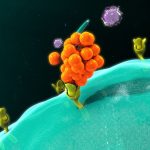Node Smith, ND
A recent study has found a link between the use of Proton-pump inhibitors (PPIs) and pneumonia in the elderly.1 PPIs are a commonly used class of drugs for the treatment of heartburn and stomach ulcers. They are generally viewed as safe by the conventional medical community and utilized very often, however, there is mounting evidence that they may not be as completely safe as thought, especially in the elderly.
Stomach acid is vital to the breakdown of food and absorption of nutrients
PPIs work by inhibiting the production of stomach acid in the stomach. Although this may be effective in relieving the symptoms of heartburn, symptoms related to gastric ulcers, it also significantly changes a physiological process in the body that may have far reaching repercussions. Stomach acid is vital to the breakdown of food and absorption of nutrients – in particular vitamin B12 and minerals such as zinc, iron, magnesium and calcium. The reduction of stomach acid has been linked to other diseases such as fractures, and cardiovascular disease.
All kinds of bacteria introduced to the GI tract when we eat, or touch our mouths, etc
Stomach acid is also known to help spread infection from the gastrointestinal tract. Since there are all kinds of bacteria introduced to the GI tract when we eat, or touch our mouths, or kiss someone, there needs to be a way of keeping it from spreading through our body. The stomach acid plays a large role in this. The association between PPI use and pneumonia was studied for this reason.
Pneumonia is a major cause of death in the elderly, and many elderly individuals are also on PPIs, this relationship could be important to be aware of.
Study looked at 75,000 adults over the age of 60 who had taken prescribed PPIs regularly over a 2-year period
The study looked at 75,000 adults over the age of 60 who had taken prescribed PPIs regularly over a 2-year period. There was seen to be a higher rate of pneumonia in this group versus the general population. The authors warn against over-interpreting this data, however, also point out that it does support a general questioning of the safety of PPIs and their nonchalance usage.
Source:
- Zirk-sadowski J, Masoli JA, Delgado J, et al. Proton-Pump Inhibitors and Long-Term Risk of Community-Acquired Pneumonia in Older Adults. J Am Geriatr Soc. 2018
Image Copyright: <a href=’https://www.123rf.com/profile_denisfilm’>denisfilm / 123RF Stock Photo</a>
 Node Smith, ND, is a naturopathic physician in Portland, OR and associate editor for NDNR. He has been instrumental in maintaining a firm connection to the philosophy and heritage of naturopathic medicine among the next generation of docs. He helped found the first multi-generational experiential retreat, which brings elders, alumni, and students together for a weekend camp-out where naturopathic medicine and medical philosophy are experienced in nature. Four years ago he helped found the non-profit, Association for Naturopathic ReVitalization (ANR), for which he serves as the board chairman. ANR has a mission to inspire health practitioners to embody the naturopathic principles through experiential education. Node also has a firm belief that the next era of naturopathic medicine will see a resurgence of in-patient facilities which use fasting, earthing, hydrotherapy and homeopathy to bring people back from chronic diseases of modern living; he is involved in numerous conversations and projects to bring about this vision.
Node Smith, ND, is a naturopathic physician in Portland, OR and associate editor for NDNR. He has been instrumental in maintaining a firm connection to the philosophy and heritage of naturopathic medicine among the next generation of docs. He helped found the first multi-generational experiential retreat, which brings elders, alumni, and students together for a weekend camp-out where naturopathic medicine and medical philosophy are experienced in nature. Four years ago he helped found the non-profit, Association for Naturopathic ReVitalization (ANR), for which he serves as the board chairman. ANR has a mission to inspire health practitioners to embody the naturopathic principles through experiential education. Node also has a firm belief that the next era of naturopathic medicine will see a resurgence of in-patient facilities which use fasting, earthing, hydrotherapy and homeopathy to bring people back from chronic diseases of modern living; he is involved in numerous conversations and projects to bring about this vision.





